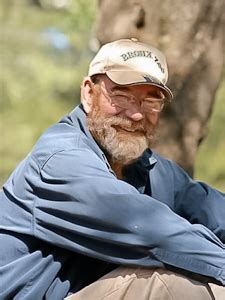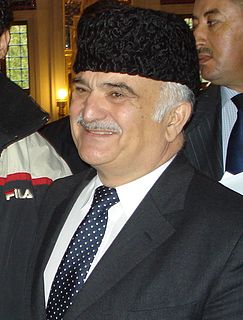A Quote by Dalai Lama
Each of us must learn to work not just for one self, one's own family or one's nation, but for the benefit of all humankind. Universal responsibility is the key to human survival. It is the best foundation for world peace.
Related Quotes
I believe that to meet the challenge of our times, human beings will have to develop a greater sense of universal responsibility. We must all learn to work not just for our own self, family, or nation but for the benefit of all humankind. Universal responsibility is the key to human survival. It is the best foundation for world peace, the equitable use of natural resources, and through concern for future generations, the proper care of the environment.
Militarists say that to gain peace we must prepare for war. I think we get what we prepare for. If we want a world where peace is valued, we must teach ourselves to believe that peace is not a ‘utopian vision’ but a real responsibility that must be worked for each and every day in small and large ways. Any one of us can contribute to building a world where peace and justice prevail.
Not only would I say that the family is important for the evangelization of the new world. The family is important, and it is necessary for the survival of humanity. Without the family, the cultural survival of the human race would be at risk. The family, whether we like it or not, is the foundation.
A truly free society must not include a peace which oppresses us. We must learn on our own terms what peace and freedom mean together. There can be no peace if there is social injustice and suppression of human rights, because external and internal peace are inseparable. Peace is not just the absence of mass destruction, but a positive internal and external condition in which people are free so that they can grow to their full potential.
Why do we so mindlessly abuse our planet, our only home? The answer to that lies in each of us. Therefore, we will strive to bring about understanding that we are--each one of us--responsible for more than just ourselves, our family, our football team, our country, or our own kind; that there is more to life than just these things. That each one of us must also bring the natural world back into its proper place in our lives, and realize that doing so is not some lofty ideal but a vital part of our personal survival.
As human beings we all want to be happy and free from misery.
We have learned that the key to happiness is inner peace.
The greatest obstacles to inner peace are disturbing emotions such as
anger and attachment, fear and suspicion,
while love and compassion, a sense of universal responsibility
are the sources of peace and happiness.
The Universal Declaration of Human Rights recognizes that 'if man is not to be compelled to have recourse, as a last resort, to rebellion against tyranny and oppression', human rights should be protected by the rule of law. That just laws which uphold human rights are the necessary foundation of peace and security would be denied only by closed minds which interpret peace as the silence of all opposition and security as the assurance of their own power.
Throughout history, religious differences have divided men and women from their neighbors and have served as justification for some of humankind's bloodiest conflicts. In the modern world, it has become clear that people of all religions must bridge these differences and work together, to ensure our survival and realize the vision of peace that all faiths share.
The Church is likewise conscious of the responsibility which all of us have for our world, for the whole of creation, which we must love and protect. There is much that we can do to benefit the poor, the needy and those who suffer, and to favour justice, promote reconciliation and build peace. But before all else we need to keep alive in our world the thirst for the absolute, and to counter the dominance of a one-dimensional vision of the human person, a vision which reduces human beings to what they produce and to what they consume: this is one of the most insidious temptations of our time.
The question of real, lasting world peace concerns human beings, so basic human feelings are also at its roots. Through inner peace, genuine world peace can be achieved. In this the importance of individual responsibility is quite clear; an atmosphere of peace must first be created within ourselves, then gradually expanded to include our families, our communities, and ultimately the whole planet.
English character and English freedom depend comparatively little on the form which the Constitution assumes at Westminster. A centralised democracy may be as tyrannical as an absolute monarch; and if the vigour of the nation is to continue unimpaired, each individual, each family, each district, must preserve as far as possible its independence, its self-completeness, its powers and its privilege to manage its own affairs and think its own thoughts.



































